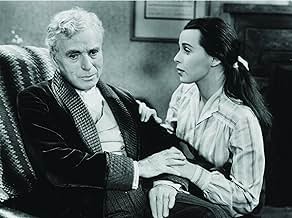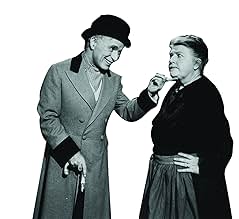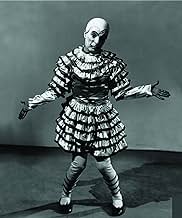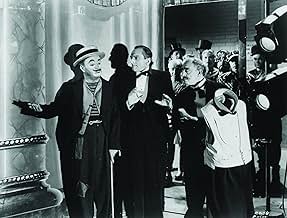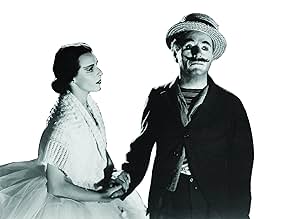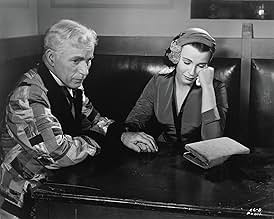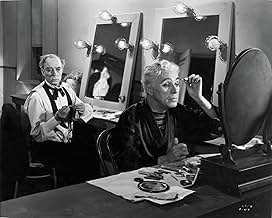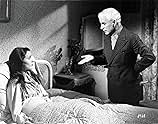ÉVALUATION IMDb
8,0/10
23 k
MA NOTE
Un comédien dépassé et une danseuse de ballet désespérée et suicidaire doivent s'unir pour trouver un but et de l'espoir dans leur vie.Un comédien dépassé et une danseuse de ballet désespérée et suicidaire doivent s'unir pour trouver un but et de l'espoir dans leur vie.Un comédien dépassé et une danseuse de ballet désespérée et suicidaire doivent s'unir pour trouver un but et de l'espoir dans leur vie.
- A remporté 1 oscar
- 7 victoires et 4 nominations au total
Molly Glessing
- Maid
- (as Mollie Glessing)
Leonard Mudie
- Dr. Blake - Calvero's Doctor
- (as Leonard Mudi)
'Snub' Pollard
- Street Musician
- (as Snub Pollard)
Billy Lee Aimone
- Little Boy
- (uncredited)
Avis en vedette
Charles Chaplin is, at least for me, the best film maker of all time. And Limelight is his best film. It is one of the 10 films I have given 100/100.
The film is about this old comedian who can't find himself a job. He saves a young girl who tried to commit suicide. Well, they become friends and stuff.
Simply the film is perfect. There is nothing bad I could say about it. Well, maybe the ballet scene was too long (but maybe I just can't concentrate enough). The script, the music, the actors, the whole philosophical structure of the film! They are all perfect. And the end of the film is something so beautiful that you really have to see it.
If there is one thing you have to see, make sure it'll be Chaplin's Limelight!
The film is about this old comedian who can't find himself a job. He saves a young girl who tried to commit suicide. Well, they become friends and stuff.
Simply the film is perfect. There is nothing bad I could say about it. Well, maybe the ballet scene was too long (but maybe I just can't concentrate enough). The script, the music, the actors, the whole philosophical structure of the film! They are all perfect. And the end of the film is something so beautiful that you really have to see it.
If there is one thing you have to see, make sure it'll be Chaplin's Limelight!
Most ordinary people fall into a role and a persona in their lives, and tend to not veer very far from it if it provides for them. Perhaps, due to extreme situations, they may find it necessary to reinvent themselves once or twice and rise to the occasion or fall into dissolution.
An artist like Chaplain had to reinvent himself over and over again over four decades, particularly in a medium that was changing every few years. That's probably why he had so many failed marriages with younger woman; he had to feel like a "player" to keep the flow going and fight back the doubt and anxiety (and the terror of becoming irrelevant) that inevitably begins to haunt creative men in their twilight years. Don't underestimate the power of sex magic!
Limelight is a film about those demons, and the immense courage (and yes, the love of a much younger woman, too, doesn't hurt), that is required to triumph over them. Still, everyone knows there is one specter that no man can outrun -- Death. Chaplain masks this existential dimension in layers of sentimental melodrama which you will have to decide for yourself is effective, but I think he does this intentionally to smuggle in some deep and darker themes that filmmakers like Bergman would become famous for continually exploring masterfully.
I found myself going back and forth with Limelight; there are times when the melodrama overpowers the film, and the pedestrian cinematography doesn't help matters. A few times I felt like I was watching the old Abbot and Costello TV show, particularly the apartment scenes. However, Chaplain is such an immense presence you can't help be engaged and encouraged to keep watching because you want so much for his character Calvero to triumph. His co-star, Claire Bloom, is quite effective, too, and she has several "looks" in this film to contrast and mirror the ongoing struggle the old comedian in having internally.
Getting on in years myself, and feeling washed up and without hope and purpose, Calvero's plight and faltering desire to once again command the Limelight was quite cathartic. I was amazed by his final performance with Keaton; when Calvero starts rocking that violin like Eddie Van Halen in his prime, I was in a state of sublime fascination. Here was a true artist giving everything up for his audience, feeling the peak thrill of having the audience at his command once again for a few fleeting moments; a thrill that, tragically, he will pay dearly for.
We can only hope that we, too, can earn such an exalted death as Calvero's. Perhaps that is Chaplain's hidden message in this film; that life is, in the final analysis, about striving for a death that ennobles those you leave behind.
An artist like Chaplain had to reinvent himself over and over again over four decades, particularly in a medium that was changing every few years. That's probably why he had so many failed marriages with younger woman; he had to feel like a "player" to keep the flow going and fight back the doubt and anxiety (and the terror of becoming irrelevant) that inevitably begins to haunt creative men in their twilight years. Don't underestimate the power of sex magic!
Limelight is a film about those demons, and the immense courage (and yes, the love of a much younger woman, too, doesn't hurt), that is required to triumph over them. Still, everyone knows there is one specter that no man can outrun -- Death. Chaplain masks this existential dimension in layers of sentimental melodrama which you will have to decide for yourself is effective, but I think he does this intentionally to smuggle in some deep and darker themes that filmmakers like Bergman would become famous for continually exploring masterfully.
I found myself going back and forth with Limelight; there are times when the melodrama overpowers the film, and the pedestrian cinematography doesn't help matters. A few times I felt like I was watching the old Abbot and Costello TV show, particularly the apartment scenes. However, Chaplain is such an immense presence you can't help be engaged and encouraged to keep watching because you want so much for his character Calvero to triumph. His co-star, Claire Bloom, is quite effective, too, and she has several "looks" in this film to contrast and mirror the ongoing struggle the old comedian in having internally.
Getting on in years myself, and feeling washed up and without hope and purpose, Calvero's plight and faltering desire to once again command the Limelight was quite cathartic. I was amazed by his final performance with Keaton; when Calvero starts rocking that violin like Eddie Van Halen in his prime, I was in a state of sublime fascination. Here was a true artist giving everything up for his audience, feeling the peak thrill of having the audience at his command once again for a few fleeting moments; a thrill that, tragically, he will pay dearly for.
We can only hope that we, too, can earn such an exalted death as Calvero's. Perhaps that is Chaplain's hidden message in this film; that life is, in the final analysis, about striving for a death that ennobles those you leave behind.
Haunting and unforgettable piece from Charles Chaplin that was nearly lost in the American cinema all together. It played in very few cities within the U.S. in 1952 and was never shown in Los Angeles due to the suspicion that the House of Un-American Acts Committee had concerning Chaplin (making no sense to me as Chaplin, who was British, was the polar opposite of a Communist from all indications). The film disappeared from U.S. soil and did not re-surface until some 20 years later in 1972 and Chaplin actually won an Oscar, with fellow scorers Raymond Rasch and Larry Russell, for this movie's original dramatic score (this was the only competitive Oscar Chaplin ever won). Chaplin stars as a washed-up vaudeville performer. He is now an elderly man (in his 60s when the film was made) and the spotlight is gone forever, even though he still secretly yearns for it. Chaplin discovers a very young ballet dancer (Claire Bloom) who has attempted suicide because she cannot handle being a performer. Naturally Chaplin cannot believe that this young, beautiful and talented woman would rather take her life than be a ballet performer (the fact that Chaplin yearns for her youth and the ability to be an entertainer again makes him bound and determined to get her back on her feet). He tries with all his might to get her performance-ready again, all the while he is also trying to resurrect the career that he lost long ago. Chaplin has a dream of a stunning performance he has on the stage, but when his act ends there is no one there to acknowledge him (one of, if not the saddest sequences I have ever seen on film). Soon it becomes obvious that Chaplin's time is running out and his desperation to have that one last piece of action engulfs his mind, body, heart and soul. "Limelight" is one of the most dramatic and intense pictures I have ever encountered. Chaplin's life and career had changed dramatically by 1952. The Little Tramp was no more, all movies had sound, some films were being made in color and the subject matter of motion pictures was slowly starting to change. In many ways Chaplin was trying to show the viewing public his life in celluloid form and "Limelight" would be the vehicle used. This is a stunning work that once again shows the humanity and overall sensitivity that Chaplin had with his movies. Chaplin's long-time rival in real-life (Buster Keaton) even shows up late and acts as a partner in the duo's stage routine. The pairing is usually the most memorable part of this production to most, but the story and the deep emotional part that Chaplin plays are the things that make "Limelight" quite possibly Chaplin's greatest cinematic masterpiece. 5 stars out of 5.
A washed-up, formerly-famous Music Hall comic, Charlie Chaplin, saves a suicidal ballerina, Claire Bloom. In the process of giving her the hope to move on and succeed, he regains the confidence to return to the stage himself.
"Limelight" is a moving and autobiographical film that works as both a bittersweet drama and a mirror into the soul of one of the world's greatest film makers. I sometimes wondered if my affection for this film is based on my knowledge of Chaplin's life and career, and the parallels between "Limelight" and people and incidents in his own life. When I watch this film I see an artist standing naked at a crossroads before his audience, unsure where to go and what to do. However, I know the film does not require an advanced degree in Chaplin to enjoy. My wife, who could probably do little more than identify the Tramp in a lineup before marrying me, loved this film before she met me. I have also had the good fortune to see the film in a theater in New York and watch it work its wonders on an audience. Stylistically, it might be dated, but the magic lingers.
"Limelight" is best viewed as a drama with comedy rather than a comedy with drama. Outwardly, it is the simple story of a vulnerable youth who mistakes her gratitude for love, and an older man wise enough to know the difference. But it's more than that too. It's about an artist's nature, and the addictive power of applause. The Chaplin character, Calvero, knows how to make people laugh, but feels he has lost the ability to do so. He realizes he is at the end of his career, but he still hungers for one final moment in the limelight. The film is talky and philosophical, and, yes, a little pompous and pretentious at times too. It's almost as if Chaplin is trying to impart through words the simple joys and mystery of life he was once able to express effortlessly through simple slapstick alone. Does this flood of words mean Chaplin has lost his skills as a film maker? No. He still has the power to move.
"Limelight" is Chaplin's final masterpiece. It is one of my favorites. I prefer to think of it as his last film. Should this be your first Chaplin film? No. Start with films like "The Gold Rush," "City Lights," and "The Great Dictator." Come to know the comedian before you get to know the man.
"Limelight" is a moving and autobiographical film that works as both a bittersweet drama and a mirror into the soul of one of the world's greatest film makers. I sometimes wondered if my affection for this film is based on my knowledge of Chaplin's life and career, and the parallels between "Limelight" and people and incidents in his own life. When I watch this film I see an artist standing naked at a crossroads before his audience, unsure where to go and what to do. However, I know the film does not require an advanced degree in Chaplin to enjoy. My wife, who could probably do little more than identify the Tramp in a lineup before marrying me, loved this film before she met me. I have also had the good fortune to see the film in a theater in New York and watch it work its wonders on an audience. Stylistically, it might be dated, but the magic lingers.
"Limelight" is best viewed as a drama with comedy rather than a comedy with drama. Outwardly, it is the simple story of a vulnerable youth who mistakes her gratitude for love, and an older man wise enough to know the difference. But it's more than that too. It's about an artist's nature, and the addictive power of applause. The Chaplin character, Calvero, knows how to make people laugh, but feels he has lost the ability to do so. He realizes he is at the end of his career, but he still hungers for one final moment in the limelight. The film is talky and philosophical, and, yes, a little pompous and pretentious at times too. It's almost as if Chaplin is trying to impart through words the simple joys and mystery of life he was once able to express effortlessly through simple slapstick alone. Does this flood of words mean Chaplin has lost his skills as a film maker? No. He still has the power to move.
"Limelight" is Chaplin's final masterpiece. It is one of my favorites. I prefer to think of it as his last film. Should this be your first Chaplin film? No. Start with films like "The Gold Rush," "City Lights," and "The Great Dictator." Come to know the comedian before you get to know the man.
Chaplin could do anything as well or better than anyone else in movies: acting, writing, directing, composing, producing, editing, even choreographing. He was world renown as a comedian, yet has placed some of the most poignant images on film that ever were. He was, even more than the great Orson Welles, a sort of one man band.
He was as successful worldwide as anyone ever was in movies. Somehow in all this, he got the idea that he had something worthwhile to say about life and art. Which he did with this film.. and I for one am extremely grateful.
The subjects of alcoholism... depression... aging... the fickle relationships of audiences and performers... these are all covered in a film that manages to fit in philosophical dialog, pantomime, dancing, and music. The multiple showings of the same comedy sequence (in a dream, in front of an unappreciative audience, in front of a wildly appreciative audience) gets one to thinking about the lemming-like nature of people in a way that someone like Chaplin would have had almost unique insight into.
It may take a while to become accustomed to the odd pacing and cadence of a Chaplin movie; once you are, you find yourself in the middle of an artistic experience like no other.
The music in this film is unusually haunting and deserving of the Academy award it belatedly received. 10 out of 10.
He was as successful worldwide as anyone ever was in movies. Somehow in all this, he got the idea that he had something worthwhile to say about life and art. Which he did with this film.. and I for one am extremely grateful.
The subjects of alcoholism... depression... aging... the fickle relationships of audiences and performers... these are all covered in a film that manages to fit in philosophical dialog, pantomime, dancing, and music. The multiple showings of the same comedy sequence (in a dream, in front of an unappreciative audience, in front of a wildly appreciative audience) gets one to thinking about the lemming-like nature of people in a way that someone like Chaplin would have had almost unique insight into.
It may take a while to become accustomed to the odd pacing and cadence of a Chaplin movie; once you are, you find yourself in the middle of an artistic experience like no other.
The music in this film is unusually haunting and deserving of the Academy award it belatedly received. 10 out of 10.
Le saviez-vous
- AnecdotesThe Academy Award that Sir Charles Chaplin won for composing this film's score is the only competitive Oscar he ever received; his other awards were given to him for special achievement outside of the established categories.
- GaffesIn discussing the ballet with the cast, the dance director Bodalink casts a giant shadow in front of the auditorium seats (revealing it to be nothing more than a backdrop).
- Générique farfelu"The glamour of limelight, from which age must pass as youth enters."
- Autres versionsThe version of the film that premiered in London in 1952 ran 141 minutes. It had been in distribution for several months, when Charles Chaplin recalled film prints and deleted a scene in which Calvero leaves the sleeping Thereza, and goes to a bar, where he meets his old friend Claudius, the arm-less violin player, who gives Calvero money. The film ran 137 minutes after this scene was edited out for worldwide distribution. In the ending credits, there is still a billing for Stapleton Kent as Claudius, even though he is no longer seen in the film. The DVD includes the deleted scene as an extra feature.
- ConnexionsEdited into Histoire(s) du cinéma: Une histoire seule (1989)
Meilleurs choix
Connectez-vous pour évaluer et surveiller les recommandations personnalisées
- How long is Limelight?Propulsé par Alexa
Détails
- Date de sortie
- Pays d’origine
- Site officiel
- Langue
- Aussi connu sous le nom de
- Limelight
- Lieux de tournage
- société de production
- Consultez plus de crédits d'entreprise sur IMDbPro
Box-office
- Brut – à l'échelle mondiale
- 9 291 $ US
- Durée2 heures 17 minutes
- Couleur
- Rapport de forme
- 1.37 : 1
Contribuer à cette page
Suggérer une modification ou ajouter du contenu manquant



